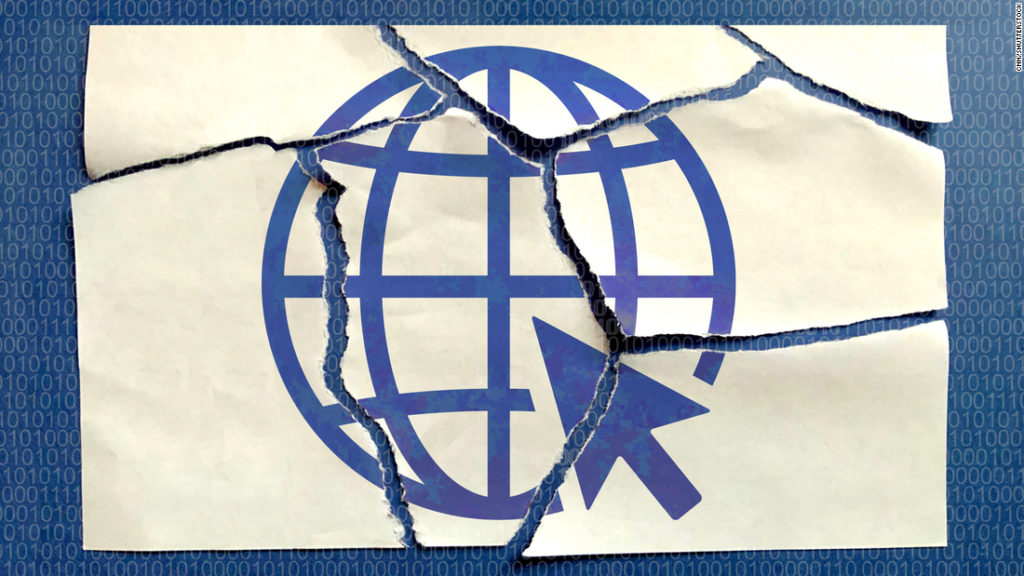But if such territorial agreements become more common, the globally-connected internet we know will become more like what some have dubbed the “splinternet,” or a collection of different internets whose limits are determined by national or regional borders.
A combination of rising nationalism, trade disputes and concerns about the market dominance of certain global tech companies has prompted threats of regulatory crackdowns all over the world. In the process, these forces are not just upending the tech companies that built massive businesses on the promise of a global internet, but also the very idea of building platforms that can be accessed and used the same way by anyone anywhere in the world.
And the cracks only appear to be getting deeper.
“I do think there is a global tendency towards fragmenting the internet much more than it has been fragmented in the past,” Daphne Keller, director of the program on platform regulation at Stanford University’s Cyber Policy Center, told CNN Business.
It’s a very different landscape from the one that allowed US tech firms to accumulate enormous wealth and power. With notable exceptions such as China and North Korea, Facebook and its peers were able to launch their products all over the world with little pushback. Now that openness may no longer be a given.
“What’s legal in Sweden isn’t legal in Pakistan, and so we have to find some way to reconcile that with the way the internet works,” Keller said. The result is that “either platforms voluntarily or governments forcibly are erecting geographical barriers, so that we see different things in one country than in another.”
The great retreat
While Facebook isn’t the only tech company in the crosshairs of governments around the globe, it is perhaps more emblematic than any other Silicon Valley business of the promise of a global internet running up against various countries’ laws.
Now, Facebook is instead turning to what’s become an increasingly tried-and-tested playbook for the tech industry: threatening to pull its products out of markets in the face of unfavorable regulation.
This time, at least, the playbook seemed to work somewhat for Facebook. But there are signs that countries around the world — including the United States — are more willing to play hardball and follow each other’s leads on reining in Big Tech. Those companies are ultimately dependent on continued access to billions of users around the world, and governments have shown they are willing to cut off that access in the name of protecting their citizens and sovereignty online.
The stakes will only get higher if more governments jump on the bandwagon.
“It’s kind of a game of chicken,” said Sinan Aral, a professor at the MIT Sloan School of Business and author of “The Hype Machine: How Social Media Disrupts Our Elections, Our Economy and Our Health.”
Aral says companies such as Facebook and Google will encounter a slippery slope if they start to exit every market that asks them to pay for its news, which would “severely limit” the content they can serve their global user base.
“They have a vested interest in trying to force any one market to not impose such regulations by threatening to pull out,” he said. “The other side is basically saying: ‘If you don’t pay for the content, you’re not going to have access to our market of consumers or the content in this market.'”
As the internet fractures, global regulators coalesce
A fight over news in Australia is a relatively small part of the clash between tech and governments, which has largely been focused on issues such as censorship, privacy and competition. But the response to Facebook’s move in Australia has shown that a more international effort to rein in Big Tech may be gathering momentum — and with it, the potential for additional fracturing of how internet services function from one country to the next.
As his government faced off against Facebook last week, Australian Prime Minister Scott Morrison issued a warning to the social media giant: what you do here may come back to hurt you in other countries.
“It would be extremely useful if governments would come together in some kind of transnational process and come up with a treaty or some kind of standard about who gets to reach out and affect content and information outside their national territory,” Keller said, “because that’s what a lot of them are trying to do, but they haven’t, and so as a result you get this very fragmented patchwork.”
If that increased fragmentation is allowed to reach its natural conclusion, however, the consequences could be dire.
“If the eventual outcome of that is that we have social media platforms in every major country or market that are separate, then what we will have is an information ecosystem that is completely bifurcated or splintered across the globe,” Aral said. “What that portends is a citizenry that has completely different sets of information about local events, about world events, and perhaps a very splintered worldview of reality.”
You may also like
-
Afghanistan: Civilian casualties hit record high amid US withdrawal, UN says
-
How Taiwan is trying to defend against a cyber ‘World War III’
-
Pandemic travel news this week: Quarantine escapes and airplane disguises
-
Why would anyone trust Brexit Britain again?
-
Black fungus: A second crisis is killing survivors of India’s worst Covid wave

